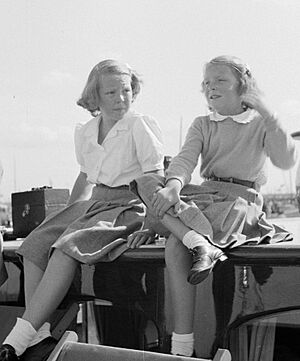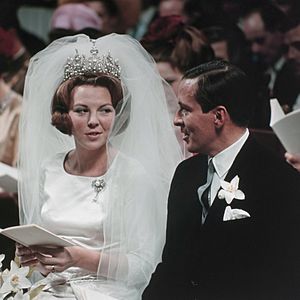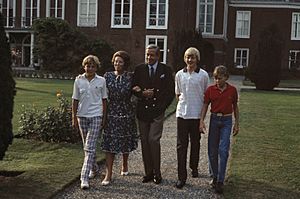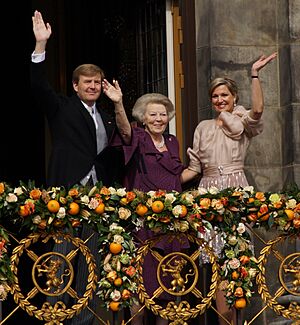Beatrix of the Netherlands facts for kids
Quick facts for kids Beatrix |
|||||
|---|---|---|---|---|---|
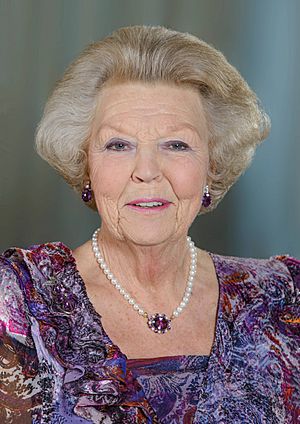
Formal portrait, 2015
|
|||||
| Queen of the Netherlands | |||||
| Reign | 30 April 1980 – 30 April 2013 | ||||
| Inauguration | 30 April 1980 | ||||
| Predecessor | Juliana | ||||
| Successor | Willem-Alexander | ||||
| Born | 31 January 1938 Soestdijk Palace, Baarn, Netherlands |
||||
| Spouse | |||||
| Issue |
|
||||
|
|||||
| House |
|
||||
| Father | Prince Bernhard of Lippe-Biesterfeld | ||||
| Mother | Juliana of the Netherlands | ||||
| Religion | Protestant | ||||
| Signature | |||||
Beatrix (born 31 January 1938) is a member of the Dutch royal house. She was the Queen of the Netherlands from 30 April 1980 until she stepped down in 2013.
Beatrix was born when her grandmother, Queen Wilhelmina, was queen. She became the next in line to the throne when her mother, Queen Juliana, became queen in 1948. Beatrix went to school in Canada during World War II. After the war, she finished her education in the Netherlands. In 1961, she earned a law degree from Leiden University. In 1966, Beatrix married Claus von Amsberg, a German diplomat. They had three children together. When her mother stepped down on 30 April 1980, Beatrix became queen.
During Beatrix's time as queen, the country's Caribbean islands changed. Aruba became its own country within the kingdom in 1986. Later, in 2010, the dissolution of the Netherlands Antilles happened. This created new special areas like Bonaire and new countries like Curaçao.
On 30 April 2013, which was Koninginnedag (Queen's Day), Beatrix abdicated (stepped down) for her oldest son, Willem-Alexander. When she stepped down at age 75, Beatrix was the oldest reigning monarch in the country's history.
Contents
Early Life and Childhood
Princess Beatrix Wilhelmina Armgard was born on 31 January 1938. Her birthplace was Soestdijk Palace in Baarn, Netherlands. She was the first child of Princess Juliana of the Netherlands and Prince Bernhard of Lippe-Biesterfeld. Beatrix was baptized on 12 May 1938 in The Hague. Her middle names come from her grandmothers, Queen Wilhelmina of the Netherlands and Armgard, Princess of Lippe-Biesterfeld.
In 1939, Beatrix's younger sister, Princess Irene, was born.
World War II and Canada
World War II started in the Netherlands on 10 May 1940. On 13 May, the Dutch Royal Family moved to London, United Kingdom. About a month later, Beatrix, her mother Juliana, and her sister Irene went to Ottawa, Canada. Her father and grandmother stayed in London. The family lived in the Stornoway residence in Canada.
While in Canada, Beatrix attended nursery school and Rockcliffe Park Public School. She was known there as "Trixie Orange." In 1943, her third sister, Princess Margriet, was born in Ottawa. After the war ended, the family returned to the Netherlands on 2 August 1945. Beatrix went to a progressive primary school called De Werkplaats. Her youngest sister, Princess Christina, was born in 1947. On 6 September 1948, her mother Juliana became Queen. Since Beatrix had no brothers, she became the next in line to the Dutch throne at age ten.
Education and Studies
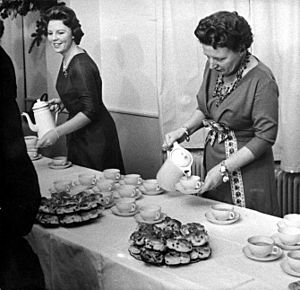
In April 1950, Princess Beatrix started at the Baarnsch Lyceum. She finished her school exams in arts and classics in 1956. On 31 January 1956, Beatrix turned 18. This meant she could take on royal duties under the Dutch Constitution. Her mother made her a member of the Dutch Council of State.
In the same year, Beatrix began studying at Leiden University. She studied subjects like sociology, jurisprudence (law), economics, and constitutional law. She also learned about the cultures of Suriname and the Netherlands Antilles. She visited many European and international organizations. Beatrix was an active student and received her law degree in July 1961.
Life as a Princess
Engagement and Wedding
In 1965, Princess Beatrix announced her engagement to Claus von Amsberg, a German diplomat. They had met at a party in 1964. Before their wedding, Claus von Amsberg became a Dutch citizen. He was then known as Prince Claus of the Netherlands.
Beatrix married Claus von Amsberg on 10 March 1966. The wedding had both a civil ceremony and a religious blessing. The civil ceremony took place at Amsterdam City Hall. The religious ceremony was held in the Westerkerk. The royal couple traveled to the ceremony in the gold state carriage.
Children of Beatrix and Claus
Beatrix and Prince Claus had three sons:
- Willem-Alexander of the Netherlands (born 1967)
- Prince Friso of Orange-Nassau (born 1968, died 2013)
- Prince Constantijn of the Netherlands (born 1969)
They lived at Drakensteyn Castle with their children. In 1981, they moved to Huis ten Bosch Palace in The Hague.
Becoming Queen
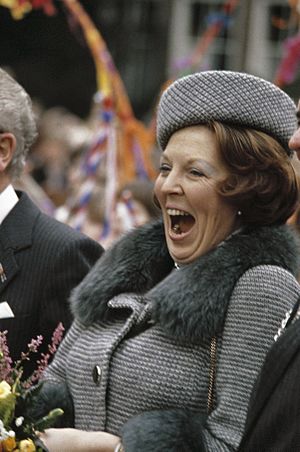
From the 1970s, Beatrix started getting ready to become head of state. She traveled a lot with Prince Claus. On 31 January 1980, her mother, Queen Juliana, announced on television that she would step down on 30 April. She would pass the throne to Beatrix.
When Beatrix was born, it wasn't certain she would become queen. The law at the time said the oldest son would inherit the throne before a daughter. It was only after it was clear Queen Juliana would not have any more children that Beatrix was confirmed as the next in line.
On 30 April 1980, Juliana stepped down. Beatrix became the 13th ruler from the House of Orange. She was sworn in and officially became monarch in the Nieuwe Kerk in Amsterdam that same day.
Her Time as Queen
As queen, Beatrix had important duties. She had to sign all new laws and royal orders. She also formally appointed officials and welcomed ambassadors. She was the highest representative of the Netherlands to other countries. She also helped unite the country.
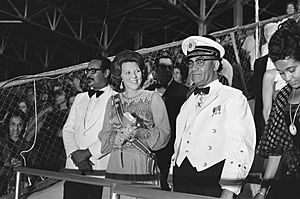
Beatrix met weekly with the prime minister. She also gave a "Speech from the Throne" each September. In this speech, the government shared its plans for the year. Her role was mostly ceremonial, meaning she didn't make laws or executive decisions herself.
On 1 January 1986, Aruba separated from the Netherlands Antilles. It became a separate country within the Dutch Kingdom.
A Memorable Moment
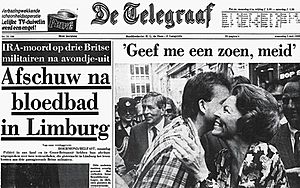
During Queen's Day in 1988, Queen Beatrix was walking through a crowd in Amsterdam. A person in the crowd, Maarten Rijkers, hugged her and gave her two kisses. This moment received a lot of media attention. An image of it was on the front page of a newspaper called De Telegraaf. People saw the Queen's reaction as very positive. This helped her popularity in that area of Amsterdam.
Later Years and Family Losses
On 6 October 2002, Queen Beatrix's husband, Prince Claus, passed away after a long illness. About a year and a half later, her mother also passed away after a long illness. Her father passed away in December 2004.
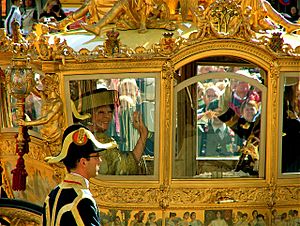
On 8 February 2005, Beatrix received a special honorary degree from Leiden University. She usually didn't accept such honors. In her speech, she talked about the monarchy and her 25 years as Queen. On 29 and 30 April 2005, she celebrated her 25th anniversary as queen. There was a concert in Amsterdam and a celebration in The Hague.
2009 Incident
On 30 April 2009, Beatrix and other members of the royal family were in a parade in Apeldoorn. A man drove his car into the parade. He narrowly missed a bus carrying the Queen. Several people were killed or seriously hurt. The royal family was unharmed, but they saw the event up close. Beatrix made a televised speech to share her shock and sadness.
Stepping Down
On 28 January 2013, Beatrix announced on national television that she planned to step down. She chose 30 April (Koninginnedag) as the date, which would be exactly 33 years since she became queen. Beatrix said it was time for a new generation to take responsibility for the country. Her oldest son, Prince Willem-Alexander, was her heir apparent (the next in line). She was the third Dutch monarch in a row to step down, following her grandmother and her mother.
The change of power, including the official ceremony for Willem-Alexander to become king, happened on 30 April 2013.
After Being Queen
After stepping down, Beatrix still takes on some royal duties. She is also a patron (a supporter) of many organizations. She lives in Drakensteyn Castle near Lage Vuursche and a townhouse near Noordeinde Palace.
Places Named After Beatrix
Many places and facilities in the Netherlands and beyond are named after Beatrix. These include:
- Streekziekenhuis Koningin Beatrix, a hospital in Winterswijk.
- Queen Beatrix International Airport in Aruba.
- Reina Beatrix School in Aruba.
- Queen Beatrix Hospital Medical Center, Sint Eustatius.
- Queen Beatrix Chair in Dutch Studies at UC Berkeley.
- Queen Beatrix Nursing Home, in Australia.
Several parks also bear her name:
- Beatrixpark in Amsterdam.
- Beatrixpark in Almere.
- Beatrixpark in 's-Hertogenbosch.
- Beatrixpark in Utrecht.
- Beatrixpark in Schiedam.
Titles and Honors
- 31 January 1938 – 30 April 1980: Her Royal Highness Princess Beatrix of the Netherlands, Princess of Orange-Nassau, Princess of Lippe-Biesterfeld
- 30 April 1980 – 30 April 2013: Her Majesty The Queen of the Netherlands, Princess of Orange-Nassau, Princess of Lippe-Biesterfeld
- 30 April 2013 – present: Her Royal Highness Princess Beatrix of the Netherlands, Princess of Orange-Nassau, Princess of Lippe-Biesterfeld
When she was queen, her official title was Her Majesty the Queen of the Netherlands, Princess of Orange-Nassau, etc., etc., etc.. The "etc." means she held many other older titles. She signed official documents simply as "Beatrix." When talking to the queen, people would first say "Your Majesty" and then "Mevrouw" (ma'am).
Beatrix has received many honors and awards from countries around the world. As queen, she was the Grand Master of important Dutch orders, like the Military Order of William. She also received honors from other countries, such as the Most Noble Order of the Garter and the Order of the Golden Fleece.
After she stepped down, she went back to her original titles from before she became queen.
Prime Ministers During Her Reign
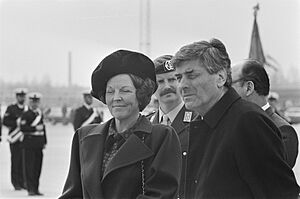
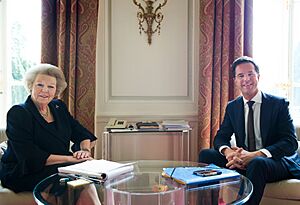
During Queen Beatrix's reign, several people served as Prime Minister in the Netherlands and its Caribbean countries. Some of the Prime Ministers of the Netherlands during her time were:
- Dries van Agt (1977–1982)
- Ruud Lubbers (1982–1994)
- Wim Kok (1994–2002)
- Jan Peter Balkenende (2002–2010)
- Mark Rutte (2010–2013)
See also
 In Spanish: Beatriz de los Países Bajos para niños
In Spanish: Beatriz de los Países Bajos para niños
 | Ernest Everett Just |
 | Mary Jackson |
 | Emmett Chappelle |
 | Marie Maynard Daly |


